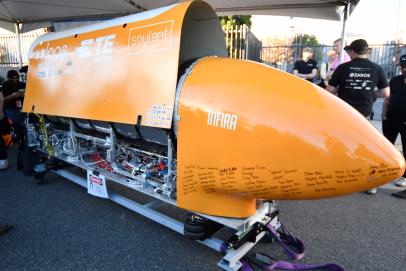China’s top engineering and rail design institutes have announced plans for the construction of the country’s first hyperloop train line, connecting Shanghai and Hangzhou.
This groundbreaking project, spanning 150km (93 miles), will feature an in-vacuum tunnel that enables maglev trains to reach speeds of up to 1,000km/h (621mph).
The Chinese Academy of Engineering, in collaboration with rail authorities, conducted a comprehensive assessment to determine the ideal location for the ultra-high-speed pipeline maglev system demonstration line.
In a report published in Railway Standard Design, scientists involved in the project revealed that Shanghai and Hangzhou emerged as the most suitable cities for the ambitious endeavor.
The Chinese Academy of Engineering plays a vital role in advising the government on scientific and technological matters, with its top experts and engineers actively participating in the conception, design, and construction of major infrastructure projects across the nation.
Led by senior engineer Zhang Yunjiao from China Railway Engineering Design and Consulting Group, the assessment team thoroughly evaluated various candidate lines for the hyperloop project, including Beijing-Shijiazhuang, Guangzhou-Shenzhen, and Chengdu-Chongqing.
Each route had distinct advantages. For instance, the Beijing-Shijiazhuang line would connect the capital with the capital city of Hebei province, relieving congestion and enhancing transportation in the northern region. A Guangzhou-Shenzhen line would link two crucial economic hubs in the Pearl River Delta, stimulating growth and development in the Guangdong-Hong Kong-Macau Greater Bay Area.
Meanwhile, a Chengdu-Chongqing line would connect two major cities in western China, fostering economic growth in the rapidly expanding Belt and Road Initiative.
Numerous factors were considered in the selection process, such as economic potential, population density, existing transport infrastructure, technical feasibility, social impact, political support, and integration with other transportation networks.
After careful evaluation, the assessment team concluded that a Hangzhou-Shanghai line would be the most feasible and advantageous option. With its high population density, vibrant economic activity, favorable terrain, and potential for regional integration, this route promises significant economic benefits and positive social impact.
Shanghai and Hangzhou are both prominent cities in China, each with its own economic and cultural significance. Shanghai, known as a global financial center, is home to the world’s largest Tesla car factory. Hangzhou, renowned for its natural beauty, serves as a hub for e-commerce companies like Alibaba.
The proposed hyperloop project holds immense strategic importance for China, as it has the potential to revolutionize transportation, offering a faster and more efficient means of moving people and goods.
With the line expected to be operational by 2035, China aims to further solidify its position as a leader in technological innovation and sustainable transportation solutions.


